The Wonder Spyglass - Part 10
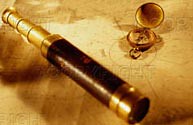 THE WONDER SPYGLASS. Part 10 - September 1956 and 1946 Read other issues here Retrospective Fiction Reviews This month in the fantastic literature: going back by 10-year jumps. Only includes the stories I've read personally. Click on the thumbnails to enlarge cover images. The idea of these "time trips" - to highlight the particular stories throughout SF&F history (all 100 years of it). Each month I will publish (time permitting) SPYGLASS issues, giving selective reviews to stories, collections, original anthologies and novels, choosing out of literally thousands of stories I've read - for example only stories which appeared in a particular month in SF magazines, and taking jumps of 10 years in SF history. This is a way for me to gradually go through stories and fill out the reviews, and a way to get a fun perspective on the genre. This issue will highlight stories from September of 1956 and 1946. ============================ FIFTY YEARS AGO: September 1956 ---------------------------------------------- 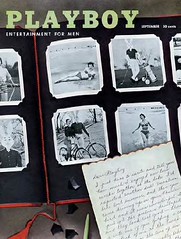 Robert Sheckley "Love, Incorporated" (also as "Pilgrimage to Earth") © Playboy, Sep 1956 --/ fourth place sf story --/ wonder award --/ style award A classic story, highly recommended. Ironic, visual, told with wit and grace, it has all the best ingredients that characterize good Fifties SF: biting social commentary (without being boring), loads of sense-of-wonder, an interesting plot and attention to detail. Here is the plot summary from David Horwich: "Alfred Simon, born and raised on a quiet agricultural planet, yearns to visit Earth, where "everything is possible", and find love. He works and saves for years to afford the trip, but once he finally arrives on Earth he learns that it's not what he expected (the poisoned paradise). He's soon disillusioned when he stumbles across a shooting gallery, with live ammunition and live female targets. A naive outworlder on a cynical, jaded planet, Simon does find love -- Love, Inc., which sells him the experience of a night of genuine love. Simon is brutally disappointed when he discovers that the experience was programmed, entirely a commodity, and in his rage he returns to the shooting gallery to vent his anger. The clash of cultures, the poisoned paradise, the ordinary man out of his environment all come together in this disturbing ending" review: 18-Sep-06 (read in 2001) ---------------------------------------------- 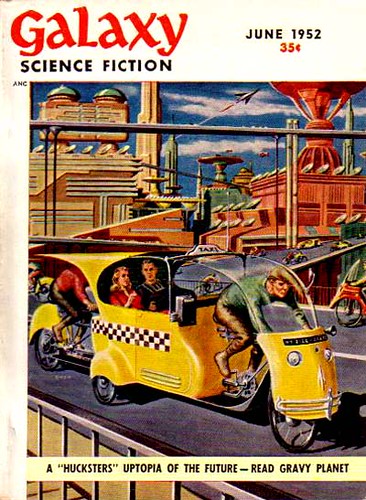 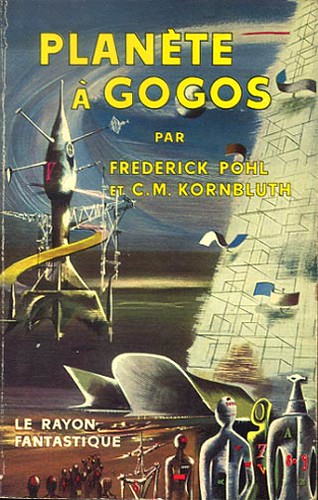 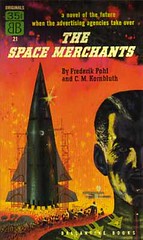 Frederick Pohl "The Space Merchants" (nv) (with C. M. Kornbluth) (also as "Gravy Planet") © Galaxy, Jun 1952 1956, Ballantine Books --book : 1956 Astounding/Analog All-Time Poll /22 (tie) --book : 1966 Astounding/Analog All-Time Poll /22 --all time novel : 1975 Locus All-Time Poll /24 (tie) --/ cool sf novel Some say that this is also a "classic science fiction novel". It definitely has been influential, but as for the joy of reading... I have to make a point here. Not all classics (critically approved) are easily digestable. Some are boring. Some are beyond boring. Some are beyond the beyond (when you get angry at the critics to the point of manslaughter). Most "classics" will leave you cold (for the simple reason of being out-dated, out-of-style... like a dry stolid trunk of a tree vs. lively off-shoot branches and flowers. It gave life to a variety of styles and then got slowly cooked in the gooey amber of ceaseless critical praise) That might be an exageration, but I have a certain distrust (and lower expectations) when I approach something labeled as "classic". Unless that classic really entered my life, shaped it and earned the title (and that might be entirely subjective experience, having nothing to do with literary values). Back to this novel - it's boring. Not beyond boring (a category reserved for the curious oddities of schlock), but simply an uninvolving "social commentary" on the perils of greed in a capitalist society... as though we haven't heard about that stuff already. Revolutionary for its time, this condemning tract lacks color and vision. Go soak in a jacuzzi, drink Irish Cream and forget about this novel. To provide a counterpoint to my opinion, here is a link to a positive review. review: 11-Sep-06 (read in 1988) ---------------------------------------------- Milton Lesser "The Music of the Spheres"  © Imaginative Tales, Sep 1956 --/ fourth place space sf story --/ wonder award --/ idea award --/ rare find Here is an example of a very entertaining story published in a pretty much "literary schlock" magazine. Milton Lesser (being a "prince", not a "king" mind you, of space opera) came up with a wondrous tale of planetary exploration and aliens made of audio-waves. Nobody has ever heard of this story; I doubt that anybody even read it in thirty years, except me and a handful of hard-core collectors. Well, it's too bad, as it is prime anthology material (editors take note). Someday Lesser will be counted among the "greater" ones again (if the world is in any degree just) - pun intended. review: 19-Sep-06 (read in 2002) 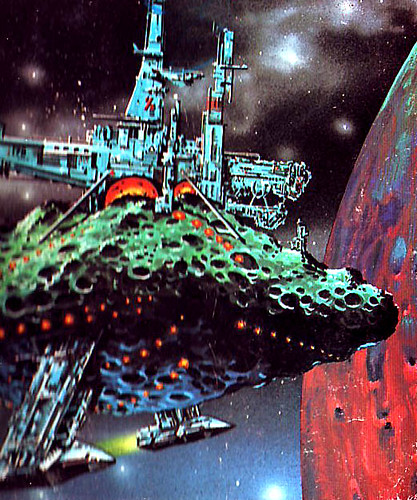 ---------------------------------------------- Milton Lesser "Operation Disaster" (nv)  (as Darius John Granger) © Imaginative Tales, Sep 1956 Speaking of Lesser, we can not discount the complete"shushera" (russian for "schlock") that he sometimes wrote. This example is so horrid, that "Operation Disaster" proves to be a very appropriate title. (at least, he chose a pseudonym - mind you, it is not a certain fact that Lesser hides behind it: sometimes it served as a "house-name" for others as well) review: 19-Sep-06 (read in 2002) ---------------------------------------------- 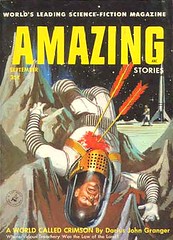 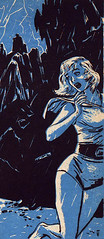 Milton Lesser "A World Called Crimson" (as Darius John Granger) © Amazing Stories, Sep 1956 --/ cool sf novel --/ idea award --/ wonder award --/ adventure award --/ awesome scale --/ rare find Hm... Milton Lesser writing as Darius John Granger, which does not promise a masterpiece. Right? Wrong. This wonderful space adventure was completely overlooked by publishers, but contains a very cool idea: an imaginary environment, created by a child. In fact the whole planet is a hilarious puzzle to human colonists until they realize that there is no logic, other than the playful fantasy of a child. A very capable alien child, of course, but still playing with his toys...which happen to be humans and all kinds of imaginary creatures, some of which are very deadly indeed. review: 19-Sep-06 (read in 2002) ---------------------------------------------- Robert Silverberg "Mind For Business"  © Astounding, Sep 1956 To Worlds Beyond, 1970 Average story about aliens trying to camouflage as humans, but not having enough... "mind for business". Silly entertainment. Typical output of Silverberg in these years - prolific and totally forgettable. It hardly needs mentioning that the second half of the Fifties were the years of the sad demise of "Astounding" magazine, with a total drop in the quality of its vision and fiction, as a result. review: 19-Sep-06 (read in 1989) ---------------------------------------------- Murray Leinster "The Swamp Was Upside Down"  (Colonial Survey) © Astounding, Sep 1956 Colonial Survey, 1956 The Planet Explorer, 1957 --/ cool sf story A typical problem-solving piece from Astounding of these years. Not very exciting, with an exotic scientific puzzle, having little application for our life... in other words a waste of time (only redeemed feature is that it is from Leinster, who brings some class to the story). Otherwise - yawn...Here is the summary from Amazon: "On Canna III, a colony was built on the only island in a water world. However, when the colonists started irrigating the soil, the water soaked down to the bedrock and there created a swamp below the surface. And now the soil of the island is preparing to slip down the bedrock, into the ocean, carrying the Canna III colonists to a watery grave. Can Bordman save this situation?". review: 19-Sep-06 (read in 1997) ---------------------------------------------- Poul Anderson "Margin of Profit"  (Nicholas Van Rijn) © Astounding, Sep 1956 Un-Man and Other Novellas, 1962 The Earth Book of Stormgate, 1978 --/ cool sf story --/ wonder award Same issue of Astounding, not quite the worst issue in the history of science fiction, but coming close. Or rather it is the essence of mediocrity, of dryness, boredom and editorial dictatorship. And the worst thing of it is that it rubbed off on the best writers in the field: Leinster and Anderson. Their efforts bring some redeeming presence to the overall sad state of later editorial affairs of John Campbell, but even they still marinate in their own scientific emotional vacuum and pretentious pomp. If I sound a bit harsh, that's because I just had my wisdom tooth pulled (seriously). Come to think of it, "Margin of Profit” is a fine story about interstellar trader van Rijn , who's showing off his understanding of economics as well as his bargaining skills. However, it is of inconsequential value and utterly forgettable. review: 19-Sep-06 (read in 1989) ---------------------------------------------- 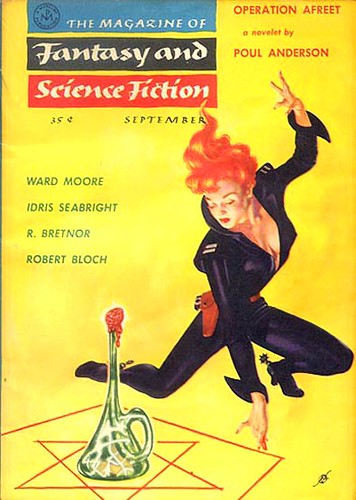 Poul Anderson "Operation Afreet" (Matuchek) © F&SF, Sep 1956 Operation Chaos, 1971 --/ fourth place f story --/ wonder award --/ adventure award Anderson writes fantasy with glee and abandon, full of cool imagery and lively action. Some kind of Harry Potter for adults, with traces of Strugatskie's "Monday Starts on Saturday" and Indiana Jones, this is only the first in a series of stories collected in "Operation Chaos". Fun, fun, fun! "In an alternate world , where the existence of God has been scientifically proven and magic has been harnessed for the practical needs of the adept, the United States is part of an alternate Second World War in which the enemy is not Germany but a resurgent Islamic Khalifate. A werewolf and a witch meet on a military mission to stop the invading Islamic army from unleashing a secret superweapon, a deamon released from a bottle in which it had been sealed by King Solomon". review: 19-Sep-06 (read in 1990) ---------------------------------------------- 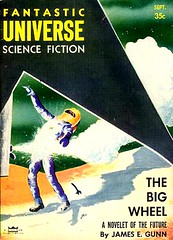 James Gunn "The Big Wheel" (Station in Space) © Fantastic Universe, Sep 1956 Station in Space, 1958 --/ cool space sf story --/ wonder award A kind of the respectable space fiction, pioneered by Robert Heinlein in his "Delila and the Space Rigger" - with lots of detail and tough-hide characters, cold detached narrative coexisting with the warm pathos of space exploration. All wrapped in an engrossing tale that really makes you cheer for the American effort and glare in righteous indignation at the fumbling Red Menace in space. Vintage Gunn, which means top-notch story-telling. It's a pity such examples of "industrial space grunge" are out of print... review: 19-Sep-06 (read in 2001) 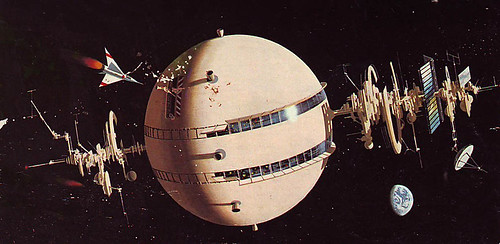 art by Vincent diFate ---------------------------------------------- 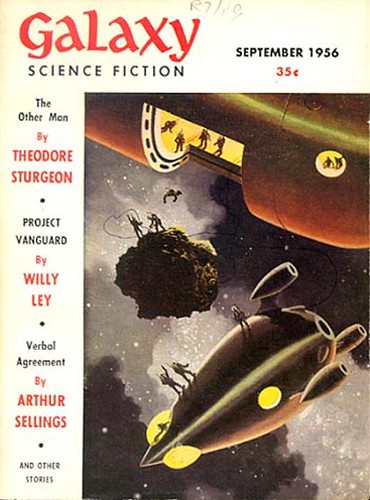 Robert Sheckley "Human Man's Burden" © Galaxy, Sep 1956 Pilgrimage to Earth, 1957 --/ cool sf story --/ wonder award Great quality from Sheckley! This is a very impressive story from his best period.An asteroid farmer orders a Frontier Model Bride with a low center of gravity, and instead is sent a Deluxe Luxury Model Bride who definitely has a high one. Also featuring "old android spirituals" that robots sing during their work (Sheckley does not give details on that, however. As you can see, this is not just an entertaining story. It is also a shrewd prediction of the convenience (and folly) of an internet shopping and bride-searching. I heard of some dubious websites shipping hamsters as a russian brides - well, not yet. review: 19-Sep-06 (read in 1987) ---------------------------------------------- 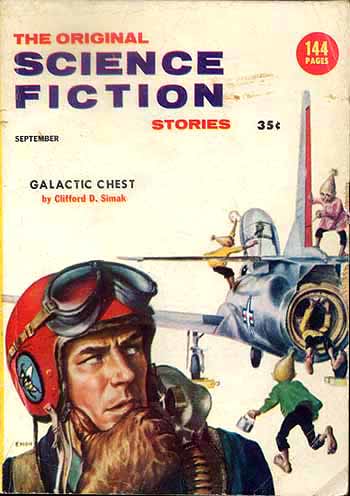 Margaret St. Clair "Consumership" © Science Fiction Stories, Sep 1956 --/ cool sf story --/ emotion award The story was translated in Russian as "Potrebiteli", and it is no wonder that communist publishers liked this biting satire against consumerism. In this story, a future society demands that people buy, spend and consume more and more products. If you don't, you face the consequences of being thrown down the social ladder. This is one of the rarest treatments of this subject, all the more so because it was not ever reprinted in any English-language anthology. review: 01-Aug-06 (read in 1984) ---------------------------------------------- Margaret St. Clair "Stawdust"  © F&SF, Sep 1956 Change the Sky, 1974 --/ fourth place space sf story --/ wonder award --/ idea award --/ shock value Absolutely surreal and at times bewildering story about a "nightmare of the senses" in a hyperspace starship, where nothing is what it seems. The cause of the hallucinations is not explained, it could be some physiological effect of hyperspace itself. The creepy feeling is top-notch, almost Hitchcock-ian it its intensity - people disappear from the ship one by one, turning into saw-dust filled dummies, and our poor girl is left alone to pilot the ship... Can she make it, as the instruments and technology itself are crumbling all around her? No, she definitely can't, and the way her doom catches up with her is quite nightmarish indeed. review: 20-Sep-06 (read in 2003) ---------------------------------------------- Harlan Ellison "But Who Wilts The Lettuce?"  (as Ellis Hart) © Amazing Stories, Nov 1956 --/ humour award This is a surreal story as well, almost as if Ellison ate some lettuce, drenched in marijuana and mushroom sauce. At least he hid under a pen-name here... I could not make much sense of this (supposedly humorous) story. Ellison was very active in 1956, writing dozens of slightly mad stories, which pulp magazines (in the beginning of their decline) gobbled up. However, some stories of his early period are total SF blockbusters, as you will see in later reviews. review: 20-Sep-06 (read in 2003) ---------------------------------------------- We have seen some good pulp issues in September 1956 (Galaxy, F&SF), and some really bad ones ("Astounding" in the same company as "Imaginative Tales" ??). A sad testament to the wilting of the lettuce, oops, of the good old pulp tradition, and embracing new more respectable (and for the most part, boring) ways. 1956 was the last year of "Thrilling Wonder Stories", and its school of writing. And it's not a compliment to the publishing industry, by the way. This tradition, however, was carried on by the paperbacks, and Ace Books picked it up nicely, with a number of intense adventures. Here is one of them: ---------------------------------------------- 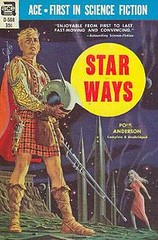 Poul Anderson "Star Ways" (nv) 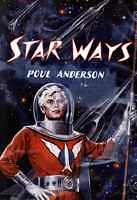 (also as "The Peregrine") (also as "The Peregrine")(Psychotechnic League) (Nomad Culture) (sequel to "Gypsy") © 1956, Ace Books revised: 1978, Ace Books --/ fourth place space sf novel --/ wonder award --/ style award --/ romance award --/ adventure award --/ rare find A sequel to "Gypsy", which is hands down the best story of Poul Anderson, and because of Anderson's place in SF, maybe THE best story in all of space science fiction, period. Nobody ever wrote a more romantic and emotional paen (hymn) to star exploration, wanderlust and sheer red-blooded male urge to "get out there". It vibrates, throbs, thrills and wants to tackle the unknown, in the best tradition of vikings and Jewish Old Testament pioneers. However, if the story was so good, the novel is watered down and only faintly resembles the original drive. It will not "kick your butt" and prompt you to drop your pitiful "hamster cage" day job in a way that "Gypsy" would, but it still makes for competent entertainment. Wandering tribes (or rather, clans) of freedom-loving space pioneers are taking on the whole Galaxy-spanning void and are establishing good old sheriff order on the frontier. A mixture of Scottish and Nordic cultural influences, a big dose of awe and humble appreciation of the vastness of space... All this is very good, however the novel drags in places and may even start to bore the reader in the end. It should've stayed as a short story. review: 20-Sep-06 (read in 2005) ============================ SIXTY YEARS AGO: September 1946 ---------------------------------------------- It is "Vintage Season", as we finally get to review a slice of the Golden Age in Science Fiction - the Forties, with a great multitude of classic short fiction published left and right... Here is a sample of what was available only in one month in the pulps: 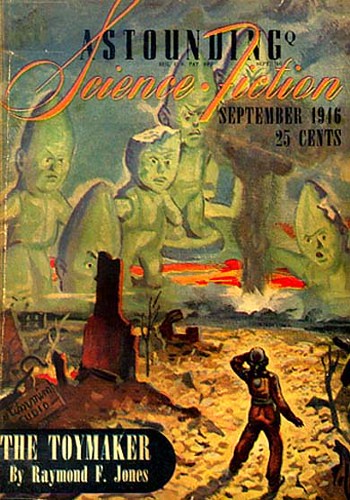 Henry Kuttner &C. L. Moore "Vintage Season" (as by Lawrence O'Donnell) © Astounding, Sep 1946 No Boundaries, 1955 --novella : 1999 Locus All-Time Poll W --/ third place time sf novella --/ wonder award --/ idea award --/ style award Tourists from the future come to witness various disasters in the past, just for the thrill of it. The idea has been used many times since (John Varley's "Millennium", Wyndham's "Pawley's Peeholes", movies, TV episodes, etc.), but this is definitely the original treatment. They say C. L. Moore largely wrote this story, with some minor additions by Henry Kuttner (maybe an encouraging kiss or two :) - this married couple of great writers were the essence of creative cuteness, as far as I can tell. Their stories were always the product of both minds, with Kuttner probably responsible for more off-beat humour, and Moore - for the "proper" plot outlines. Although, not so sure about "proper", after reading her wild fantasy outings in "Weird Tales") "Vintage Season" turned out to be a true classic, understated novella of great charm and mystery, one of the most beloved stories to ever appear in "Astounding". A fresh take on real estate success: "A couple with a mundane, everyday house to sell find themselves unwilling landlords to a trio of renters who are anything but mundane and who seem to have a particular and uncommon interest in their home. And they are not the only ones - another equally odd group also want exclusive rights to the house, at any cost." "Location, location, location" is the key to success in real estate, with location in time suddenly becoming way more important. review: 21-Sep-06 (read in 1987) ---------------------------------------------- 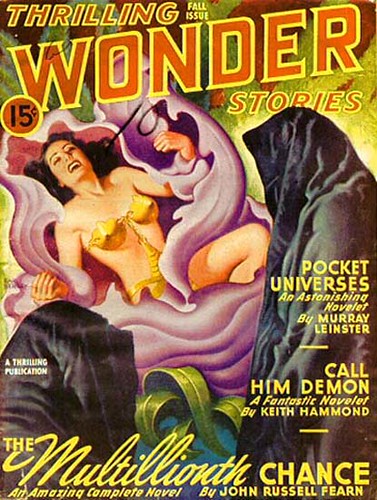 Henry Kuttner "Call Him Demon" (as by Keith Hammond) © Thrilling Wonder Stories, Fll 1946 Bypass to Otherness, 1961 --/ fourth place sf story --/ wonder award --/ idea award "In the 1920s a group of children staying at their grandmother's house realize that one of the uncles who lives there is not a real person, and only arrived there a few weeks before. He is able to exert some kind of mental influence over the adults of the household, which makes them believe he has always been a member of the family. The Wrong Uncle, as they call him , is a kind of projection -- or, more precisely, a detachable limb in human form -- of a creature which lives in a cavern deep beneath the house, accessed by a portal in the attic. The thing has only two emotions: hunger and satiety, and it only eats raw meat". The kids are giving it some meat from a local store (and are given the mental images of creature's wondrous travels as a reward), but they are running out of spare change, and the creature only gets hungrier and hungrier... Surprisingly, one of the children defeats the creature, as he proves to be at least as terrible as the creature itself. Sorry if I revealed the secret behind the story's title, but Kuttner wrote so many stories about hidden capabilities of children (not all of them benign) that it's easy to catch the drift. He obviously has some issues with kids. He suspects that they intrinsically know more of the "reality" of the world than adults do, and it makes him uncomfortable. As for myself, this only excites me beyond belief. review: 21-Sep-06 (read in 1988) ---------------------------------------------- Edmond Hamilton "Day of Judgement"  © Weird Tales, Sep 1946 © Weird Tales, Sep 1946--/ cool apocalyptic sf story --/ wonder award Reprinted in the "Last Man on Earth" anthology, and in the "Best of Edmond Hamilton" collection, this story has all the right ingredients to impress and to stay with the reader, and yet it falls short, somehow. More moody and sad than his usual style in the Thirties, it may even be compared to "Twilight" by John Campbell. Having said that, the story is unmemorable, partly because it sticks to the canon of post-apocalyptic fiction so closely. Not the best piece, but certainly not one to discount entirely, as everything written by Hamilton for "Weird Tales" contains that special "sensa-vonda". review: 21-Sep-06 (read in 1988) ---------------------------------------------- Fritz Leiber "Alice and the Allergy"  © Weird Tales, Sep 1946 --/ fourth place f story --/ wonder award --/ idea: ghost allergies --/ style award --/ rare find Hilarious stuff. Some people can be allergic to ghosts, which can prove quite useful and also annoying at the same time. You have to read it to believe it. Maybe Leiber got into a bet that he could write an interesting story about... sneezing. Surely he won here, as this vintage slice of black humour hilarity will brighten up your day. review: 21-Sep-06 (read in 1988) ---------------------------------------------- Isaac Asimov "Evidence"  (Robot series) © Astounding, Sep 1946 I, Robot, 1950 --/ fourth place sf story --/ idea award (for the whole series) Meanwhile, Asimov continues to build his impressive "Robots" series with this thought-provoking installment. Wikipedia says it best: "In his short story " Evidence", Asimov lets his recurring character Dr. Susan Calvin expound a moral basis behind the Three Law of Robotics. Calvin points out that human beings are typically expected to refrain from harming other human beings (except in times of extreme duress like war , or to save a greater number). This is equivalent to a robot's First Law. Likewise, according to Calvin, society expects individuals to obey instructions from recognized authorities: doctors, teachers and so forth. Finally, humans are typically expected to avoid harming themselves, which is the Third Law for a robot. The plot of "Evidence" revolves around the question of telling a human being apart from a robot specially constructed to appear human; Calvin reasons that if such an individual obeys the Laws, he may be a robot or simply "a very good man". Another character then asks Calvin if robots are then very different from human beings after all. She replies, "Worlds different. Robots are essentially decent." review: 22-Sep-06 (read in 1989) ---------------------------------------------- Good quality stories from great writers... large scale vistas, moral investigations, off-beat humour, breakthrough ideas - all are there, in 1946 pulps. The next issue will wrap up September Spyglass by going back all the way to 1906. Read other issues here CONTINUE TO NEXT PAGE ---------------------------------------------- Labels: Spyglass |
Click to go to "Dark Roasted Blend" site
|
|
Collecting Pulp Magazines Ephemera Interview with Avi Abrams |

|
Enchanting Victorian Fairy Tale Art "Then world behind and home ahead..." |

|
Exceptional British Scifi Artwork from the 1950s Space Pulp Art by Ron Turner and other British artists |
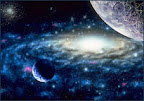
|
Pulp Pleasures: Eando Binder Great space adventure fiction from the 1930s "Where Eternity Ends" and other rare gems |
Also read recent posts:
Author's Pen Names - Most Complete List Ever
The Wonder Timeline: SF&F Restrospective
Space Adventure Article
|
"SF&F Reading Experience" is part of "Dark Roasted Blend / Thrilling Wonder" family of sites. We try to highlight the most entertaining and rewarding science fiction and fantasy, with emphasis on memorable reader experience, not necessarily general acceptance by the critics. Have fun, and delve into our extensive ratings and reviews! Most reviews are written by Avi Abrams, unless otherwise noted. Reviews also appear on our unique historical retrospective page Wonder Timeline of Science Fiction. Feel free to submit your own review, if a particular story is not listed here. All major OFFICIAL AWARDS are highlighted in BLUE ("winner" has a letter "W" by it, otherwise it is a runner-up only) Our PERSONAL AWARDS (ratings) are highlighted in RED and PURPLE: --/ first place : --/ second place : --/ third place : --/ fourth place : --/ cool : (equal to fifth place) ALL "BEST OF" LISTS ARE LOCATED HERE These awards are given in the following categories: - novel : - series : - novella : - story : - collection : Also, there are our personal STYLE / GENRE SPECIFIC AWARDS. These reflect the story's content and the lasting impression on the reader: --/ wonder award sense-of-wonder, "visual intensity" and inventiveness --/ idea award originality of idea / concept --/ adventure award exhilarating plot, excitement / action --/ style award outstanding literary qualities, inimitable style --/ romance award intense and beautiful love / relationships --/ humour award funny and cool --/ emotion award touching, lasting impression, sensitivity --/ shock value altogether wild --/ awesome scale mind-boggling; further enhances sense-of-wonder --/ rare find very hard to locate, mostly from old pulps, never reprinted, etc. Again, please feel free to leave your own review or comment under every writer's entry; also recommend us other stories you liked. |
0 Comments:
Post a Comment
<< Home